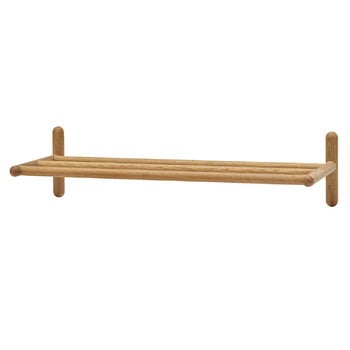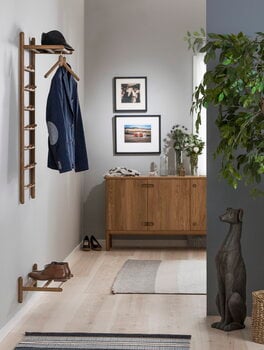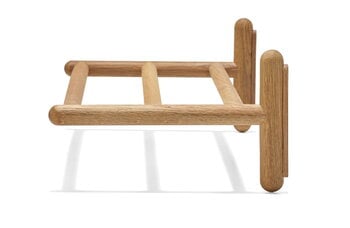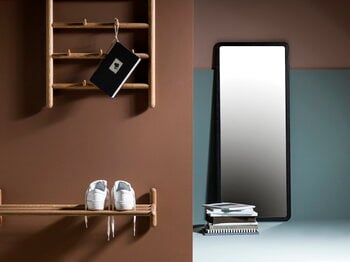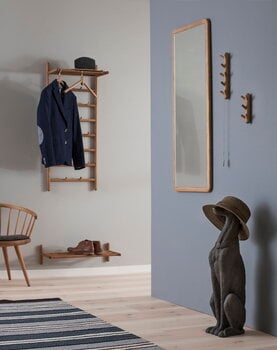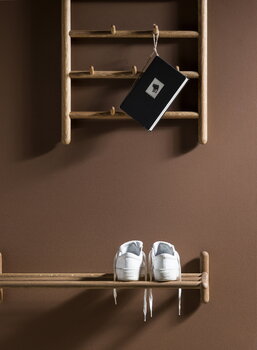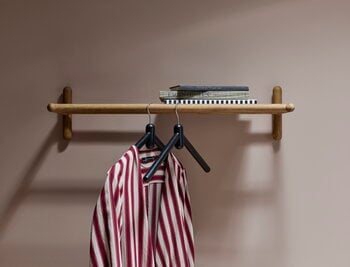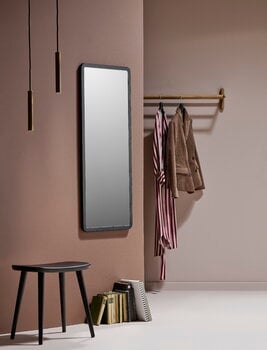Stolab's Miss Holly hat rack is designed for contemporary needs but with respect for Stolab's history. The hat rack, designed by Jonas Lindvall in 2017, is made of solid oak, with its look dominated by rounded shapes and the natural warmth of the material itself. If mounted lower on the wall, Miss Holly also makes a great shoe rack. The wooden hat rack is manufactured at Stolab's own factory in Smålandsstenar, Sweden.
Miss Holly shoe/hat rack, oiled oak
Stolab
Description
Stolab's Miss Holly hat rack is designed for contemporary needs but with respect for Stolab's history. The hat rack, designed by Jonas Lindvall in 2017, is made of solid oak, with its look dominated by rounded shapes and the natural warmth of the material itself. If mounted lower on the wall, Miss Holly also makes a great shoe rack. The wooden hat rack is manufactured at Stolab's own factory in Smålandsstenar, Sweden.
Product details (5)
- Colour
- Oiled oak
- Width
- 73 cm
- Depth
- 30 cm
- Height
- 18 cm
- Material
- Oak
- Product ID
Designer
Jonas Lindvall is a Swedish architect, interior designer and furniture designer specializing in solid wood furniture. Lindvall has a very diverse background in design, having studied interior architecture in Gothenburg, furniture design at the Royal College of Art in London and architecture at the Royal Danish Academy of Arts. The timeless design language of his furniture combines forward-looking vision with an appreciation for tradition and craftsmanship. Lindvall lives and works in Malmö.
Reviews (0)
Sustainability
The Product Sustainability Framework, our criteria of sustainable design, helps you find the most sustainable products in our selection. Read below which sustainability criteria this product has met.
Working conditions & labour 6/9
-
Equal opportunities for all employees
-
Commitment to UN Global Compact, fair compensation for all employees
-
Corporate responsibility requirements defined and communicated for suppliers
-
Systematic work for improved inclusion and well-being in the workplace
-
Transparent supply chain
-
Suppliers' compliance to a code of conduct ensured
-
Direct suppliers audited and certified
-
Compliance to the UN Guiding Principles on Business and Human Rights ensured in the supply chain
-
Support for community involvement in the supply chain
Eco-friendly production 6/9
-
Fair and resource-wise water-use in production
-
No incineration or landfilling of returned items
-
No use of endangered species as materials
-
No direct environmental emissions or waste (excl. GHGs) from production
-
The sustainability of direct suppliers' production is addressed and monitored
-
Production and material sourcing that respect biodiversity, animal rights, and natural ecosystems
-
Material-efficient and ecological packaging
-
Positive impact on nature’s well-being through operations that regenerate natural ecosystems
-
No potentially harmful chemicals used in own production
Climate impact 3/8
-
Company's direct greenhouse gas emissions identified and commitment to reduction
-
Product's carbon impact identified and commitment to reduction
-
Guidance on energy- and eco-efficient use of the product
-
Contribution to climate initiatives beyond the brand’s direct operations
-
Low-carbon or compensated transportation
-
Carbon footprint of the product calculated and goals set to reduce it
-
100 % renewable energy in own production and operations
-
Carbon neutral or carbon negative product
Sustainable materials 5/6
-
Sustainable and long-lasting material choices
-
No harmful or hazardous substances
-
Responsible raw material sourcing and production
-
Materials suited for circularity: monomaterials, recyclable finishings, renewable or recycled contents etc.
-
Ecological materials: natural, biodegradable, recyclable or recycled contents
-
Outstanding materials in terms of innovativeness, responsibility, sustainability and circularity: local production or sourcing, 100 % recycled content, C2C-certification etc.
Circular design 2/5
-
High aesthetic quality promoting long-term use of the product
-
Technically durable product design and material choices
-
Design for enduring life-long quality
-
Design and support for product maintenance, repair and upgradability
-
Innovative circular design solutions: circular service system, resale platform, remanufacturing, collection of used products, etc.
